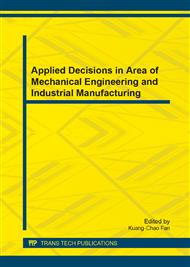p.310
p.317
p.321
p.325
p.329
p.334
p.338
p.342
p.346
Based on Multi-Estimator Technology to Control Speed of Induction Motor
Abstract:
In order to improve the reliability of the control system, and to reduce the uncertainty of control process, this paper presents an excellent algorithm to control the induction motor speed using series estimator technology. The physical speed sensor is not used to detect speed of the motor, while applying the vector analysis method, through the stator current and the rotor flux are calculated to estimate motor speed. Corresponding to sensorless control drawbacks, the self-tuning control scheme is proposed through control scheme reformed. The double estimator technology is applied to reform scheme, the first order estimator is used to identify the system parameters, the second order estimator is used to calculate the parameters of the controller on-line, and control function is given real-time to control the speed of the motor, the simulation results show that the given control technology is advanced.
Info:
Periodical:
Pages:
329-333
DOI:
Citation:
Online since:
July 2014
Authors:
Price:
Сopyright:
© 2014 Trans Tech Publications Ltd. All Rights Reserved
Share:
Citation:


